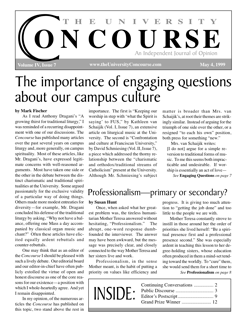Professionalism—primary or secondary?
by Susan Hunt
Once, when asked what her greatest problem was, the tireless humanitarian Mother Teresa answered without hesitating, “Professionalism.” The abrupt, one-word response dumbfounded the interviewer. The answer may have been awkward, but the message was precisely clear, and closely connected to the way Mother Teresa and her sisters live and work.
Professionalism, in the sense Mother meant, is the habit of putting a priority on values like efficiency and progress. It is giving too much attention to “getting the job done” and too little to the people we are with.
Mother Teresa constantly strove to instill in those around her the order of priorities she lived herself: “Be a spiritual presence first and a professional presence second.” She was especially ardent in teaching this lesson to her degree-holding sisters, whose education often produced in them a mind-set tending toward the worldly. To “cure” them, she would send them for a short time to a home for the dying. Unfailingly, this cure prevailed, for it taught a deeper lesson than can be learned from books.
Having volunteered in one of these homes for the dying, I experienced personally how it can change one’s outlook on life. For we will all find ourselves before the throne of God one day, judged by how we treated one another, more than how we “performed” or whether we succeeded in the worldly sense.
I am definitely not advocating unprofessionalism, or bad business. It’s simply a question of priorities. Mother Teresa’s earthly father was a good businessman, and the family always had a flare for caring for the less fortunate. Perhaps by his example during those precious formative years of her childhood the seeds were planted that years later germinated into the principles for which the Missionaries of Charity constitution stands today.
Mother Teresa was a living witness of the truth she so often declared: “we are called upon not to be successful, but to be faithful.” In place of the ambition to acquire praise, to be in charge, to control all—the typical hallmarks of professionalism—she radiated humility. And yet she rose to be quite a powerhouse of authority, winning the admiration of the whole world.
Today, in the rush of consumerism and a society plagued by profit-making goals, it is no wonder that we tend to allow the demands of the present moment to sweep over us like ocean waves—eventually carrying us out to the sea of a materialistic life. In this way, one can clearly see how our self-imposed secular values can easily spill over to what could be one of the worst spiritual enemies—materialism.
Let us strive to follow the example of this saintly nun and spread a network of love around our communities and workplaces. As I pass by my boss’ office every day, I’m empowered when I glimpse at the wooden sign on his desk which reads, “FAITHFULNESS NOT SUCCESS.”
Perhaps we could all gain a lesson here: place this sign not only on our desks, but in our hearts.
Susan Hunt works in the Development Office. She spent several years as a volunteer for the Missionaries of Charity in Washington, DC, where she had the privilege of meeting Mother Teresa. She is currently working on a book about Mother Teresa’s impact on her life.


